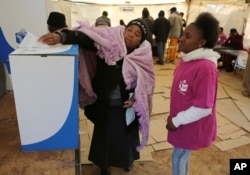Election results released Thursday show South African voters turning away from the long-dominant African National Congress party in large numbers, and denying them an outright win in major urban areas.
While the ANC — the party credited with leading South Africa out of apartheid — will continue to hold more local government seats than any other party, this election has yielded decisive gains by the opposition Democratic Alliance, especially in metropolitan areas like Johannesburg, the economic hub; Pretoria, the capital; and the seaside city of Port Elizabeth. The DA already holds the city of Cape Town and surrounding Western Cape Province.
The far-left Economic Freedom Fighters also made gains nationally, but not enough to dominate any major urban areas.
Voters said they were dismayed by numerous scandals within the ANC, the corruption allegations that persistently swirl around President Jacob Zuma, and the enduring inequality and unemployment that they feel the ANC has not remedied since it came to power in 1994.
The election results could have major effects in the future, according to Susan Booysen, a professor of governance at the University of the Witwatersrand and author of Dominance and Decline: The ANC in the Time of Zuma.
"It has huge implications, I think, for governance in South Africa and for party politics,” she said. “It probably means, in the first place, that the ANC will be … forced to step back and reflect on how they will be approaching national and provincial elections in 2019."
That's when the nation will return to the polls for national elections. Zuma's second — and final — term ends in 2019.
In the meantime, the opposition parties will have a chance to show their mettle — but, Booysen notes, they may still be under the thumb of the ANC.
"It is inevitable that there will be coalition governments in some of these cities, where even the EFF and the DA in most of these metro cities remain only the second-biggest party after the ANC," she said.
It is clear the ruling party has been given a wake-up call, and many critics say the ANC's fall from grace can be directly attributable to one man: the president.
Zuma’s hometown of Nkandla, where he remodeled a family home using about $20 million in government funds, offers a stark example of his unpopularity.
As of Thursday, the ANC no longer controls Nklanda. Zuma's party soundly lost his hometown to the relatively obscure Inkatha Freedom Party.





